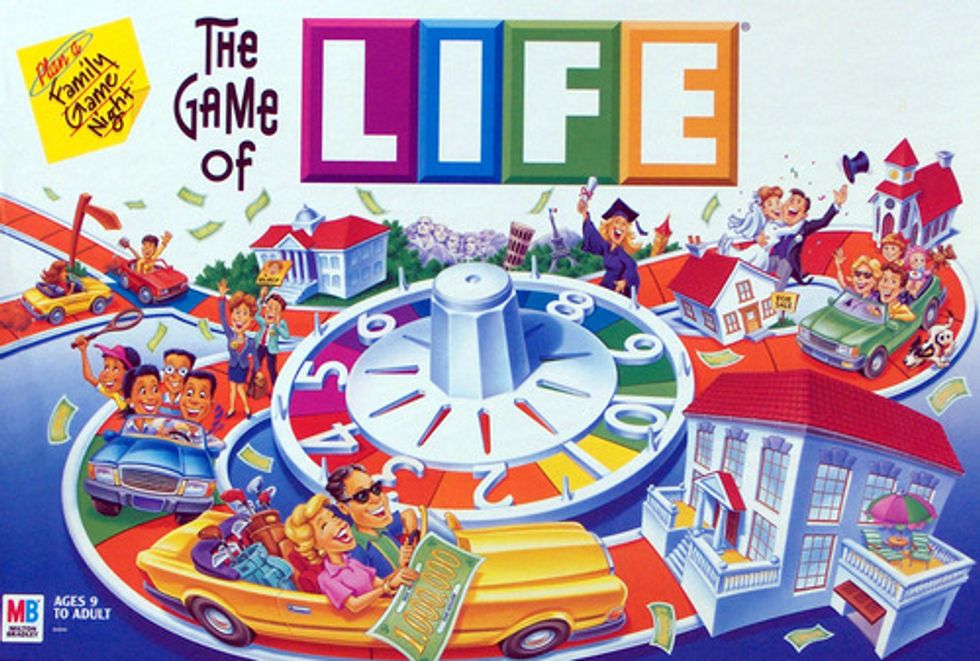Growing up, at every sleepover or party that I attended, I distinctly recall sitting down in a circle and playing one specific board game: "The Game of Life." During this board game, players go through a path from start to finish, experiencing various events and situations that happen to actual people in real life. For example, one's house could get destroyed due to a hurricane, and the player owes the bank some $50k. However, although this board game seems, in theory, not as exciting as say "Clue" or "Monopoly", it taught me a lot of things that I have experienced as I've grown up as being true, or false, in the real world.
1. To succeed financially, you have to go to college.
When I would play as a child, I was eager to get the show on the road, and I would skip the college path completely, jumping right into the career. I would draw a card and I would be ecstatic—a police officer: how cool! However, at the end of the game, I would realize that all of my friends, most of whom chose the college path, had a considerably larger sum of money than I did, as well as the fact that they were all able to buy the houses that they wanted. It wasn't until I looked through the "College Career" stack of cards that I finally noticed that the reason for this was a college career paid almost twice the amount mine did. With a sigh, I acknowledged college as a must.
2. It's expected of you to have children.
It's almost insane how many tiles on "The Game of Life" board are dedicated to providing the player with children. In fact, in the newer version of the game I recently played, there's even a spot where you have to stop and take a turn on the spinner to decide how many children you get. There's really no escaping having upwards of three children in this game; oftentimes, I would have too many to fit in the six-person car. Having children was another expectation I was previously unaware of as a child.
3. You don't always get everything you want or expect.
I can't even remember how many times I played this game and wanted to be—really, even expected to be—a lawyer who bought the biggest and most expensive mansion in the "Housing" stack of cards. Of course, during these games I always ended up being a poor artist who lived in a shack and never had enough money to pay off all the car loans I took out of the bank. Meanwhile, my friends were basically bathing in their fake money, happy with their jobs and their living arrangements. I ended up having a good time playing anyway, and maybe not getting what I wanted was what made it exciting.
4. You can marry whoever you want!
There was no judgment during our many rounds of "The Game of Life" when we were children--if you played as a little pink plastic person, then nobody really said anything if you decided to put another little pink plastic person beside you in the car when you passed the marriage tile. The same went for if someone chose to be a little blue plastic person (regardless of the actual gender identity of the person playing) and decided to elope with another little blue plastic person. Nobody batted an eye or said anything. We were all free to bring into our plastic cars whatever little stub of a person, pink or blue, we wanted to.
5. Everyone ended up having similar experiences, regardless of how our lives were.
Although my experiences with "The Game of Life" were unfortunate, (always with me being the poorest member of the game who had too many children, an unsatisfying career, and a house that was literally breaking at the boards) my friends and I always ended up going through similar experiences that ranged from natural disasters to community competitions and family circumstances. It was comforting, as a child, to know that regardless of what our careers were, how many kids we had, and where we lived, we all had the same goals and were going in the same direction--through the ever-twisting, always changing, path of life.
While "The Game of Life" did teach me some things that proved to be false as I grew up, it was something that made me pay attention to my decisions and the outcomes of my decisions. Obviously, real life is nothing like the game—people experience different things, and life is different for everyone, based upon gender, race, and economic status. There isn't as much acceptance, and money seems to run out much quicker. It was fun, as a child, to be able to remain innocent and play into the idea that life consists of spinning a dial, marrying someone, having kids, and experiencing all the ups and downs there are to see. However, although real life is full of misfortune, difficulties, and drastic ups and downs, it's still an amazing thing full of happiness and beautiful people. I wouldn't change anything about it.


























